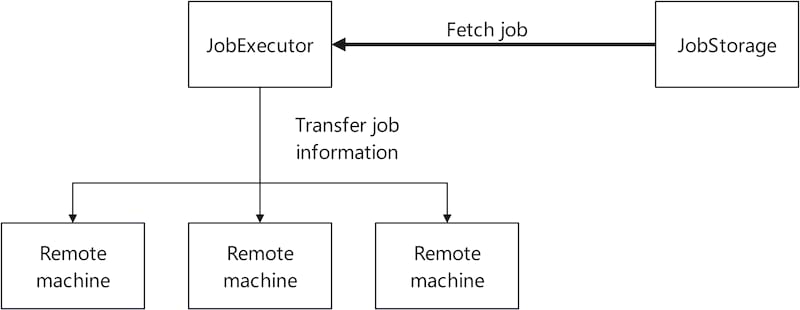12个版本 (稳定)
| 1.1.7 | 2024年6月14日 |
|---|---|
| 1.1.6 | 2023年10月25日 |
| 1.1.4 | 2023年9月1日 |
| 1.1.2 | 2023年8月27日 |
| 0.1.4 | 2022年12月30日 |
#176 in 异步
390KB
748 行
TOKIO-SCHEDULER-RS
另一个JobScheduler
功能
- 完全异步
- 使用tokio运行时编写
- 最大可定制性
- 支持钩子
- 支持自动重试
- 支持分布式任务执行(您需要自行实现)
- 默认支持
tracing
示例
use std::sync::Arc;
use tokio_scheduler_rs::{job_hook::JobHook,job_hook::JobHookReturn,async_trait,DefaultJobExecutor, JobScheduler, MemoryJobStorage, JobContext, JobFuture,Value,ScheduleJob};
struct ExampleJob;
impl ScheduleJob for ExampleJob{
fn get_job_name(&self) -> String {
String::from("ExampleJob")
}
fn execute(&self, ctx: JobContext) -> JobFuture {
Box::pin(async move{
println!("Hello, World! My JobId is {}",ctx.get_id());
Ok(Value::default())
})
}
}
struct ExampleHook;
#[async_trait]
impl JobHook for ExampleHook {
async fn on_execute(&self, name: &str, id: &str, args: &Option<Value>) -> JobHookReturn {
println!(
"Task: {} with id: {} and args: {:#?} is going to execute!",
name, id, args
);
JobHookReturn::NoAction
// If you want to Cancel this running ONLY THIS TIME:
// JobHookReturn::CancelRunning
// or you want to Cancel this running and remove this schedule forever:
// JobHookReturn::RemoveJob
}
async fn on_complete(
&self,
name: &str,
id: &str,
args: &Option<Value>,
result: &anyhow::Result<Value>,
retry_times: u64,
) -> JobHookReturn {
println!(
"Task: {} with id: {} and args: {:#?} is complete! Result is: {:#?}, retry time is: {}",
name, id, args, result, retry_times
);
JobHookReturn::NoAction
// If you want to Cancel this running and remove this schedule forever:
// JobHookReturn::RemoveJob
// Or if you want to retry this job:
// JobHookReturn::RetryJob
}
async fn on_success(
&self,
name: &str,
id: &str,
args: &Option<Value>,
return_vaule: &Value,
retry_times: u64,
) -> JobHookReturn {
println!(
"Task: {} with id: {} and args: {:#?} is complete! ReturnValue is: {:#?}, retry time is: {}",
name, id, args, return_vaule, retry_times
);
JobHookReturn::NoAction
// If you want to Cancel this running and remove this schedule forever:
// JobHookReturn::RemoveJob
// Or if you want to retry this job:
// JobHookReturn::RetryJob
}
async fn on_fail(
&self,
name: &str,
id: &str,
args: &Option<Value>,
error: &anyhow::Error,
retry_times: u64,
) -> JobHookReturn {
println!(
"Task: {} with id: {} and args: {:#?} is complete! Error is: {:#?}, retry time is: {}",
name, id, args, error, retry_times
);
JobHookReturn::NoAction
// If you want to Cancel this running and remove this schedule forever:
// JobHookReturn::RemoveJob
// Or if you want to retry this job:
// JobHookReturn::RetryJob
}
}
#[tokio::main]
async fn main() {
// Create a new `job_storage`, you can impl it by yourself.
// !!! PLEASE NOTICE THAT MEMORYJOBSTORAGE SHOULD NOT BE USED IN PRODUCTION !!!
let job_storage = Arc::new(MemoryJobStorage::new(chrono::Utc));
// Create a new `job_executor`.
// You should register your job hook here
let job_executor = DefaultJobExecutor::new(
job_storage.to_owned(),
Some(10),
Some(Box::new(ExampleHook)),
30
);
let scheduler = JobScheduler::new(job_storage, job_executor);
// Register a job
scheduler.register_job(Box::new(ExampleJob)).await.unwrap();
// Set a schedule with given cron expression.
// !!! PLEASE NOTICE THAT YOU MUST REGISTER THE JOB FIRST !!!
scheduler
.add_job(&ExampleJob.get_job_name(), "* * * * * * *", &None)
.await
.unwrap();
// Don't forget to start it.
println!("Start scheduler");
scheduler.start();
tokio::time::sleep(std::time::Duration::from_secs(10)).await;
// Wait for all jobs are processed and stop the schedule.
// The `JobExecutor` will stop execute NEW job once you execute this.
println!("Stop scheduler");
scheduler.wait_for_stop().await;
}
示例
您可以在examples目录中查看示例。
贡献
如果您有想法,可以创建一个pull request或提交一个issue。
欢迎任何形式的贡献!
分布式任务执行
如您所见,在JobExecutor trait中,我们定义了两个函数:start和stop。
因此,您可以定义自己的JobExecutor,轮询JobStorage并将任务信息通过任何方式传输到远程。
在远程机器上,您应该定义具有给定name的Job,然后使用从原始JobExecutor机器接收到的任务信息(new JobContext)执行它。

路线图
- 添加更多测试
- 开箱即用的分布式任务执行系统
许可
MIT
依赖
~7–15MB
~176K SLoC